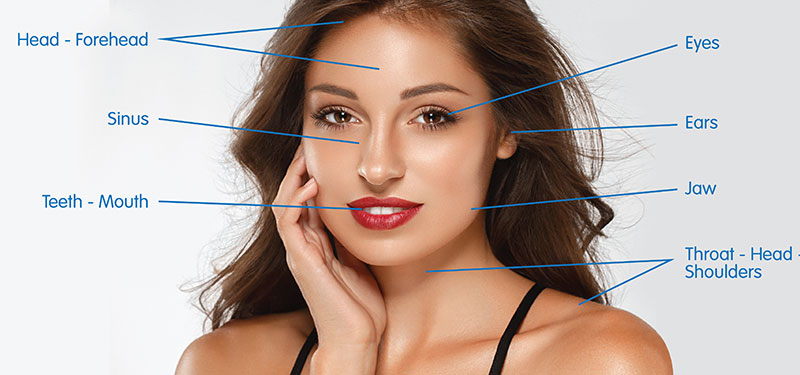Project Description
Signs, Symptoms And Cause Of TMJ Disorder
What Are The Symptoms Of TMJ?
Whilst the actual cause of a TMJ disorder is often unknown, there are many contributing factors that can lead to or aggravate the joint. Because some other conditions can cause similar symptoms to TMJ, it is important for your Dental Specialist to diagnose the source of the jaw pain first.
Because the temporomandibular joints are complex structures containing muscles, tendons, and bones, many people we treat often say they would have three-quarters of these signs and symptoms at some point or another.

To break these up into facial features they would be:
Jaw
- Clicking or popping or grating sounds
- Pain moving jaw
- Uncomfortable jaw movements
Teeth or Mouth
- Clenching or grinding teeth at night
- Sensitive or painful teeth
- Unable to find a comfortable or proper bite
Forehead & Head
- Headaches or migraines around forehead or temples
- Shooting pain in the back of the head
- Hair or scalp painful to touch
Ears
- Ringing or humming in the ears
- Loss of hearing
- Ear pain or aching without any infection
- Itchy or blocked ears
- Vertigo and dizziness
Eyes
- Sensitivity to light
- Pressure pain behind the eyes
- Bulging or bloodshot eyes
Sinus
- Post-nasal drip or feeling of foreign object in sinuses
- Pressure and pain without any infection
Neck & Throat
- Neck or shoulder pain
- Limited range of movement side to side and feeling stiff
- Difficulty swallowing
- Frequent coughing or throat clearing
- Feeling or sensations of a foreign object in throat
- Voice irregularities or changes
These symptoms below are best described by the patients themselves.
- I just woke up and my jaw was locked and can’t open my mouth
- I have pain in my ear and feels like someone poking a pen or screwdriver into my ear
- I feel as though I can’t hold my face up any longer
- I have had clicking in the jaw for years
- I have suffered migraines and headaches for more than 30 years
- I am extremely tired and exhausted from my facial muscles holding up my face
- I want to go out and have dinner with friends and family and not eat like a horse
- My teeth don’t feel as though they fit together properly
- My jaw dislocates when I eat
- I get dizzy a lot
- I grind my teeth at night
- I clench my jaw in my sleep
- My face is swollen on one side
- My jaw is tender to touch
- I can’t bite an apple or eat steak
- I just went deaf all of a sudden without any cold virus or symptoms of ear infection
- I have pain in my shoulder and back of neck
How many these following symptoms listed below can you relate to?

Injuries from Whiplash – Clenching of Teeth – Misaligned fillings – Crooked Teeth
What Are The Causes Of TMD?
Probably the most common causes of TMD consists of:
- Missing teeth and clenching or grinding teeth at night which, in most occasions, is linked to stress
- Physical stress that creates tension in the jaw muscles
- Sometimes dislocations occur of the TMJ through injuries and
- Mis-alignment of teeth during growth or after major dental treatment
- Incorrectly fitted or shaped dental fillings
- Incorrectly designed crowns or bridges
- Arthritis in the joint
- Trauma or whiplash injuries
The good news is….there is help out there. There are 3 steps in this process.
- Occlusal Splint Therapy including Counselling concerning Oro-Facial habits
- Bite Adjustment with spot grinding in hinge bite, occlusal adjustment, and occlusal equilibration
- Bite Reconstruction (left, right and forward bites) Take This Link
- Jaw joint noises like clicking, popping, crunching, and crepitus of the deranged or displaced disc
- Pain or ringing in the ears
- Locking of the jaw
- Neck or shoulder pain
- Headaches, migraine, and jaw joint pain
- Restricted opening and movement and facial pain
- Dizziness
- Trouble chewing or sensitive teeth
- Swelling on one side of your face
